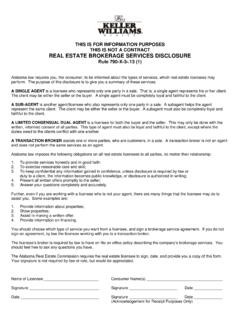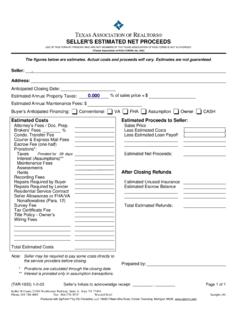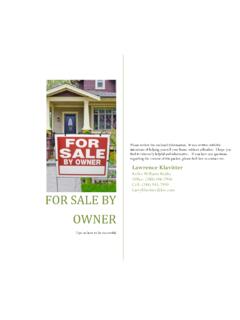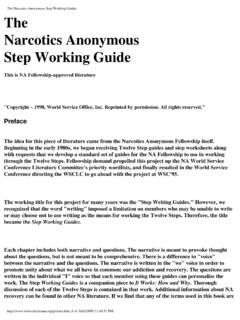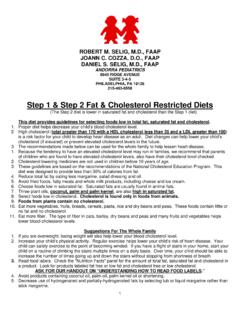Transcription of STEP 1 STEP 2 STEP 3 STEP 4 STEP 5 STEP 6 STEP 7 STEP 8
1 step 1 step 2 step 3 step 4 step 5 step 6 step 7 step 8 If you re renting and have a stable job with some savings, and a credit score in the high 600 range, you can likely qualify for FHA or conventional financing at historically low rates. The key question you need to consider is, of course, why are you still renting? Think about it for a moment. If your reason is fear, then it may be time to let go of that fear and focus on the facts of home ownership. Here is one example. Fear: I can t afford to buy my dream : The best way to get closer to buying your dream home is to buy your first y few people can afford to buy their dream home when they buy their first home. In fact, according to the National Association of Realtors , 69 percent of first-time home buyers in the United States compromised on some features of their first home.
2 So you make some compromises, buy your first home, and star t building equity. This approach takes you fur ther and faster down the road to being able to own your dream home than if you hadn t purchased a home at all. Gary Keller and his wife Mary serve as a great example of how this works. They used their first home as a forced savings plan for their future dream home. They even made additional pr incipal payments when they could to accelerate their equity buildup. Interestingly, this approach allowed them to pay off their first home in about eight years. Then, all that financial equity was available to help them build a second home their dream 1: Decide to BuyDo you really want to pay someone else's mortgage?For more information on deciding to buy, see chapter 1 in Your First on next page.
3 Sheila s friend Chris believes he can t afford to pays $800 in rent each s housing costs for the year are $9, , even though he thinks he s saving money by renting, he actually spends about $1,150 more than Sheila and he s not building any equity!Sheila s $900 mortgage includes $700 of total house payments are $10,800 annually. At the end of the year, $8,400 (12 months x $700) is tax deductible in the United States. She is in the 28 percent tax bracket, so her tax savings are $2,352 ($8,400 X .28).Her actual housing costs for the year are $8,448($10,800 - $2,352). And Sheila has built $2,400 in VS. RENTINGCAN YOU REALLY AFFORD TO KEEP RENTING? step 1 step 2 step 3 step 4 step 5 step 6 step 7 step 8 Purchasing your own home is a great investment that provides specific financial advantages, including equity buildup, value appreciation potential, and tax benefits.
4 It s also a forced savings plan that you cannot get from renting! So, again, ask yourself if you can really afford to keep renting. Here is an example 1: Decide to BuyFor more information on deciding to buy, see chapter 1 in Your First all else, when done r ight , home ownership can help lay the foundation for a life of financial secur ity and personal choice. There is never a wrong time to buy the right home. All you need to do in the short run is find a good buy and make sure you have the financial ability to hold it for the long run. The most important rule for keeping your stress to a minimum is that you don t have to know everything leave that to your real estate ..The seven main roles your real estate agent will per for m include the following: step 1 step 2 step 3 step 4 step 5 step 6 step 7 step 8 W hen you re looking for a real estate professional to help you, know that above all else good agents put their clients 2: Hire Your AgentHow about putting a champ in your corner?
5 1. Educate you about your Analyze your wants and Guide you to homes that fit your Coordinate the work of other needed Negotiate on your Check and double-check paperwork and Solve any problems that may more information on hiring your agent, see chapter 2 in Your First 1 step 2 step 3 step 4 step 5 step 6 step 7 step 8 It s nor mal to ask how much you can afford,and you might begin by considering your monthly rent payment. You ll also need to factor in all of your expenses and then revisit your income. Lenders use fairly strict guidelines and for mulas to dictate how much you can spend on your mortgage payment, which typically includes PITI, or principal, interest, taxes, and homeowner s insurance. And if you finance at less than 20 percent down, you ll likely need to pay PMI or private mor tgage insurance as well.
6 It s a lot to think about. Ultimately, keep in mind that your lender will preapprove you for a certain amount, but YOU will decide what you re comfor table paying ever y month. And you always want to leave room for the unexpected costs and opportunities from furnishing to repairs to lender decides what you can you decide what you can 3: Secure FinancingHow much home canyou comfortably afford?Olivia and alex each earn $4,000 a , their maximum hOusing payments wOuld be 28 percent Of their incOmes, Or $1,120. hOwever, their financial prOfiles are really very different,leading them tO very different decisiOns abOut hOw much they can hAS $15,000 IN STUDENT LOANS, jUST BOUGhT A NEw CAR, AND hAS SEVERAL CREDIT CARDS wITh payment $350 Student loans $150 Credit card minimum + $150 Monthly nonhousing debt $650 Maximum total debt payment(36 percent of $4,000) $1,440 $650 Safe housing payment $790 ALEx S STUDENT LOANS ARE PAID OFF, hE hAS LITTLE CREDIT CARD DEBT, AND hIS CAR IS AN ECONOmY payment $200 Credit card minimum + $50 Monthly nonhousing debt $250 Maximum total debt payment(36 percent of $4,000)
7 $1,440 $250 Safe housing payment $1,190 For more information on securing financing, see chapter 3 in Your First 1 step 2 step 3 step 4 step 5 step 6 step 7 step 8 5 step 3: Secure Financingcontinued ..Be sure to follow these six steps to financing your home:1. Choose a loan Make a loan application and get Determine what you want to pay and select a loan Submit to the lender an accepted purchase offer Get an appraisal and title Obtain funding at remember, you don t need to save up a lot of money for the down payment. A conventional mortgage can require as little as a 5 percent down payment, and there are even some first-time buyer programs and FHA loans that require even less. And once again, only you can decide what you can paymenttOtal interest paid Over 30 years$136,000$150,000$166,0008%7%6%$998$ 998$995$223,251$209,263$192,291 Interest rates impact how much houseyou can affordIf you can afford a $1,000 monthly mortgage payment (not including taxes and insurance), a low interest rate can allow you to afford a higher-priced home.
8 Your rate will also determine how much interest you pay over the life of your loan. For the last twenty years, the mortgage interest rate averagedapproximately 8 percent in both the United States and more information on securing financing, see chapter 3 in Your First 4: Find Your HomeWhere, or how, do you begin your search? step 1 step 2 step 3 step 4 step 5 step 6 step 7 step 8 So you are preapproved and ready to begin your search. But how or where do you begin? The best thing to do is consult with your agent to more accurately pinpoint the home you are looking for. This is likely the biggest investment you ll ever make, and you ll need to create a criteria for a home that meets all of your important needs, and as many of your additional wants as possible. Some questions you might ask yourself include: What do I want my home to be close to?
9 How much space do I need and why? Which is more critical: location or size? Would I be interested in a fixer-upper or a new home? How important is home value appreciation? Is neighborhood stability a priority? Would I be interested in a condo? What features and amenities do I want? Which do I really need?You ll learn as you look at homes, it s wise to refine your priorities along the way. And your agent is experienced and can help expedite the home wants and needs criteria:LocationSizeConditionAppreciati onNeighborhoodFreestanding or condo/town home, resale or new contstructionFeatures and amenitiesPotential for expansionor improvmentFor more information on finding your home, see chapter 4 in Your First ! So you ve found a home you love. Now you need to make a compelling offer. The three basic components of your purchase offer are price, terms, and contingencies.
10 Price is obviously the dollar amount you are approved for, willing, and able to pay. Terms cover the other financial and timing factors that will be included in your offer. Contingencies are clauses that let you out of the deal if the house has a problem that didn t exist or that you weren t aware of when you went under contract. Contingencies specify any event that will need to take place in order for you to fulfill the contract. Okay, it can get admittedly confusing here. So look to your agent to guide you. Keep in mind, the r ight pr ice to offer should reflect the fair market value of the home you want to buy. Your agent s market research will help guide this hat s a fair pr ice for 345 Cardinal lane? Three bedrooms baths 1,550 square feet No recent updates On busy street Average-sized yard Listed as handyman s special Sold last week for $90/square foot, or $139,5007 step 5: Make an OfferSo what's a fair price for the home you love?




